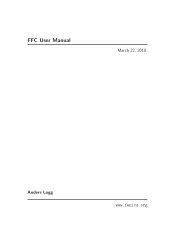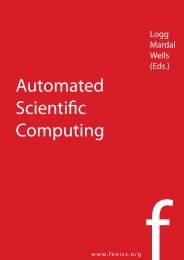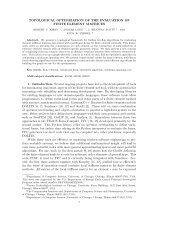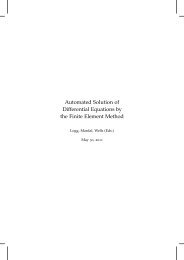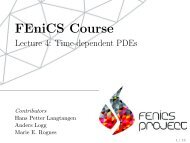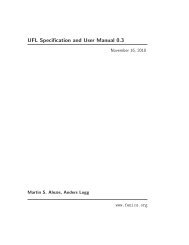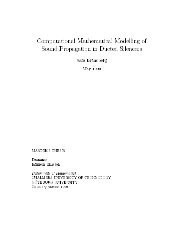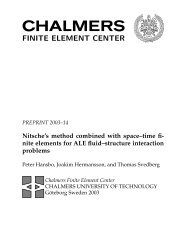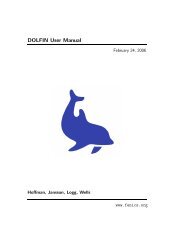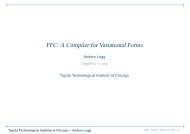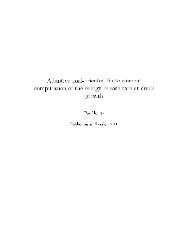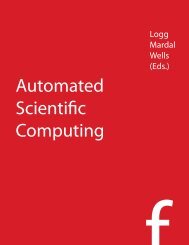cmake - FEniCS Project
cmake - FEniCS Project
cmake - FEniCS Project
You also want an ePaper? Increase the reach of your titles
YUMPU automatically turns print PDFs into web optimized ePapers that Google loves.
Configure And Build<br />
Åsmund Ødegård<br />
Simula Research Laboratory AS<br />
November, 2006<br />
<strong>FEniCS</strong>’06<br />
© 2006
What we will talk about<br />
A rather short survey of available solutions<br />
We only consider Open Source systems<br />
Some of the solutions applied to dolfin<br />
The currently selected solution for PyCC<br />
© 2006
What is the challenge?<br />
Installing software on peoples computer is the second<br />
thoughest challenge (HPL)<br />
You get 5 minutes attention span!<br />
Most people unfortunately run Windows, so you have to<br />
support that.<br />
Binary distribution isn’t always feasible. Source distribution is<br />
hard.<br />
© 2006
What are really the main problems<br />
Developers want something powerfull, flexible, but still possible<br />
to comprehend.<br />
(Advanced) users should be able to figure out things when<br />
somethings goes wrong<br />
For plain users your system should simply works.<br />
Packaging - how should software be delivered to end-users?<br />
© 2006
On the more technical side<br />
Audit trails - what cause this flag in the build<br />
Hierarchical configure and build - namespaces<br />
Error messages should appear early!<br />
On the more philosophical side: How much of your system do<br />
you really need to inspect?<br />
Pessimistic view: I really need to check everything<br />
Optimistic view: I expect that my system works<br />
© 2006
© 2006<br />
There is no perfect system around!
There is no perfect system around!<br />
Who are the main players in the field?<br />
© 2006
There is no perfect system around!<br />
Who are the main players in the field?<br />
The ancient (in)famous Autotools<br />
© 2006
There is no perfect system around!<br />
Who are the main players in the field?<br />
The ancient (in)famous Autotools<br />
CMake of kitware/VTK fame<br />
© 2006
There is no perfect system around!<br />
Who are the main players in the field?<br />
The ancient (in)famous Autotools<br />
CMake of kitware/VTK fame<br />
SCons, grown out of the perl-based Cons<br />
© 2006
There is no perfect system around!<br />
Who are the main players in the field?<br />
The ancient (in)famous Autotools<br />
CMake of kitware/VTK fame<br />
SCons, grown out of the perl-based Cons<br />
BuildSystem from PETSc, Matt’s pet<br />
© 2006
There is no perfect system around!<br />
Who are the main players in the field?<br />
The ancient (in)famous Autotools<br />
CMake of kitware/VTK fame<br />
SCons, grown out of the perl-based Cons<br />
BuildSystem from PETSc, Matt’s pet<br />
Ant from the Apache world<br />
© 2006
There is no perfect system around!<br />
Who are the main players in the field?<br />
The ancient (in)famous Autotools<br />
CMake of kitware/VTK fame<br />
SCons, grown out of the perl-based Cons<br />
BuildSystem from PETSc, Matt’s pet<br />
Ant from the Apache world<br />
Jam, and variants like FTjam, Boost.jam<br />
© 2006
Autotools - no intro required!<br />
Autoconf, Automake, Libtool, and Gettext<br />
Generated “standard” makefiles<br />
Use make to actually do the build<br />
Not so nice syntax. Based on sh and the M4<br />
macro language<br />
Backtrack on errors can be really hard.<br />
Produced make-files are really messy.<br />
The configure script in dolfin is 24627 lines.<br />
© 2006
CMake<br />
Developed by Kitware (VTK!)<br />
Selected by the KDE team recently<br />
Description files must be written in special<br />
CMake syntax.<br />
© 2006
CMake<br />
project(DOLFIN)<br />
set(CMAKE_CXX_FLAGS "-Wall -ansi")<br />
# Configuration parameters<br />
set(PETSC_DIR, /usr/local/lib/petsc)<br />
option(ENABLE_PETSC, "Enable PETSc support")<br />
option(ENABLE_CURSES, "Enable curses support")<br />
option(ENABLE_DEBUG, "Turn on debugging and warnings")<br />
option(ENABLE_BOOST, "Enable BOOST support")<br />
if (ENABLE_DEBUG)<br />
add_definitions(-DDEBUG=1)<br />
set(CMAKE_CXX_FLAGS "-g ${CMAKE_CXX_FLAGS}")<br />
endif (ENABLE_DEBUG)<br />
© 2006
CMake<br />
Developed by Kitware (VTK!)<br />
Selected by the KDE team recently<br />
Description files must be written in special<br />
CMake syntax.<br />
Simple but maybe not very powerful syntax<br />
© 2006
Features of CMake<br />
Strong on cross-platform development<br />
Can generate Makefiles, kdevelop projects and<br />
VisualStudio projects<br />
Multiple compilation trees possible from a single<br />
sourcetree.<br />
Mainly a configure tool?<br />
Quite mature! But lacks in documentation<br />
Large user community.<br />
Open Source<br />
© 2006
SCons - a quite different tool<br />
While its ancient roots is the Perl based Cons, SCons is<br />
implemented in Python<br />
Python also used as definition language<br />
Began as ScCons, which won SC build competiton in 2000<br />
Recently turned down by the KDE project<br />
Actually, SCons combined with bksys, a wrapper created for<br />
KDE.<br />
The bksys guy forked SCons into Waf recently.<br />
Replaces make!<br />
Different concept of signatures (MD5 vs. time stamp)<br />
© 2006
Features of SCons<br />
Strong on cross-platform development<br />
Supports for many languages, swig included<br />
Built-in support for CVS, Bitkeeper, Perforce<br />
Unfortunately, no support for SVN and Mercurial<br />
Still beta, good for build, not configure<br />
Works with Python ≥ 1.5.2<br />
Smaller community.<br />
Open Source. Good documentation.<br />
© 2006
BuildSystem<br />
Someone here knows this much better!<br />
Implemented for PETSc?<br />
Primarily a configure system, output Makefiles<br />
Written in Python! Only requires Python to run.<br />
Supports version control systems (Bitkeeper, what else?)<br />
Open Source. Not so good documentation<br />
No community.<br />
It does its job, but have issues...<br />
© 2006
Apache Ant is a Java-based build tool<br />
In theory a replacement for make<br />
Use XML for descriptions/buildfiles<br />
Fully buzzword compliant?<br />
Open source, large community<br />
Cross plattform development<br />
© 2006
Jam and all it’s variants<br />
The original Jam is from perforce<br />
Versions from freetype.org and Boost<br />
Main strength that it understands C/C++<br />
Can parse targets for #include to figure out what needs to<br />
be compiled<br />
All the variantes tell me it’s not a perfect thing<br />
I really do not known Jam though. I have heard of enough<br />
people struggle with it.<br />
© 2006
What else have we<br />
I have found numerous other tools mentioned:<br />
© 2006
What else have we<br />
I have found numerous other tools mentioned:<br />
tmake/qmake<br />
MakeXS<br />
GConfigure<br />
buildtool<br />
package-framework<br />
MakeNG<br />
nmake<br />
Maven<br />
Waf - fork of SCons<br />
The commericial world?<br />
Probably other systems I<br />
don’t know about....<br />
© 2006
Some experiments with Dolfin<br />
Arve Knudsen have done some experiments with SCons and CMake.<br />
Only very a very limited part of dolfin is considered in these experiments.<br />
No configure-tests are actually carried out<br />
© 2006
Dolfin and CMake<br />
Write a CMakeLists.txt in the root and eventually in subdirectories<br />
<br />
Run <strong>cmake</strong> . to create Makefiles in batch mode<br />
Run <strong>cmake</strong> -i to run CMake interactively. All settings defined in the<br />
CMakeLists.txt file, as well as some system variables can be modified<br />
CMakeLists.txt files are quite clean<br />
© 2006
Dolfin and SCons<br />
Write a SConstruct file in the root<br />
Write SConscript files in various subdirectories<br />
As SCons is not a preprocessor to make, the buildrules must<br />
be defined explicitly<br />
Run by saying scons in the root directory.<br />
A submodule can be compiled with scons -u in that directory.<br />
Central concept: the Environment<br />
<br />
© 2006
Pros and Cons<br />
Pros - CMake<br />
Clean syntax<br />
Large user community<br />
Cons - CMake<br />
Special macro language<br />
Not much documentation<br />
available for free<br />
Rely on make for<br />
Looking into the CMake<br />
system for VTK doesn’t give<br />
me great confidence<br />
Pros - SCons<br />
Based on Python<br />
Decent documentation<br />
Support multiple buildenvironments<br />
(but not true<br />
hierarchical)<br />
Can run under the regular<br />
python debugger (pdb)<br />
Cons - SCons<br />
Lacks proper configure<br />
Lot of relatively black magic<br />
Build-files can be messy if not<br />
implemented with care<br />
© 2006
Making SCons work for us<br />
We are currently using SCons for PyCC.<br />
We have just started prototyping a configure system for<br />
SCons<br />
Our experience is that SCons feels more like a framework<br />
for building configure and build system, than a system in it<br />
self - at least for larger projects<br />
Maybe that is what we need, and maybe what SCons has is<br />
suitable for our needs<br />
© 2006
Offloading the work<br />
It is common that a configure system do all the searching for<br />
information about external dependencies.<br />
In our system, pkg-config will provide information about<br />
external dependencies (Include dirs, lib dirs, compile and link<br />
flags).<br />
We provide a pkg-config “generator” that do the searching if<br />
no pkg-config is found.<br />
We still have to test that the information pkg-config<br />
provides, is usable!<br />
© 2006
Simple description of submodules<br />
PyCC is organized in several submodules<br />
To ease the burden for the developer, we have implemented<br />
a simplified way of specifying sources and dependencies, in<br />
Dependencies = ["numpy-1"]<br />
LibSources = ["Conductivity.cpp", "FiberInterpolator.cpp"]<br />
A swig directory with a file module.i within the directory for the submodule<br />
will trigger building of a swig wrapper.<br />
We create a SCons build environment (Environment) for each submodule.<br />
There are other things as well that can be set in scons.cfg.<br />
© 2006
SCons and configure<br />
We are currently trying to prototype a separate configure<br />
step for SCons.<br />
It will use the scons.cfg files to figure out what is needed.<br />
pkg-config is used to pull in information.<br />
Using the build-system in SCons, tests can be carried out.<br />
All necessary information is stored using cPickle, and read<br />
when the user needs to build.<br />
This system is by no means ready for consumption.<br />
© 2006
© 2006<br />
Other slides
Cross language<br />
reference counting<br />
Åsmund Ødegård, Ola Skavhaug, and others.<br />
© 2006
Cross language reference counting<br />
Consider some python code where a python object is sent to<br />
some wrapped C/C++ function:<br />
def somefunc(x):<br />
y = filter(x)<br />
c = SomeC++function(y)<br />
return c<br />
c.doSomething() #seg.faults<br />
Now, if the object ‘c’ use a pointer to data living<br />
inside y, we get a seg.fault when c.doSomething() is<br />
called, due to garbage collection.<br />
© 2006
A few words on the context<br />
Some C++ library<br />
Wrap the library with SWIG<br />
Use the library from Python<br />
We want something we can plug in with the<br />
SWIG typemap system<br />
From the C++ side it should be transparent<br />
whether an object has connections to Python<br />
or not, when it comes to ref. count<br />
© 2006
The <strong>FEniCS</strong> server<br />
As I am in charge of running the server, does<br />
anyone have any request?<br />
© 2006



